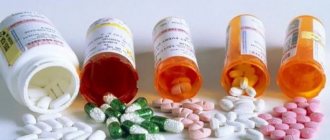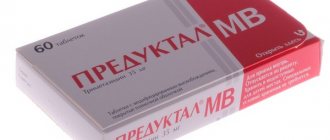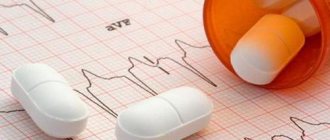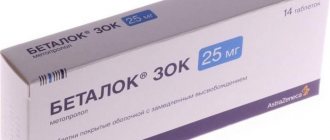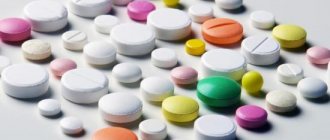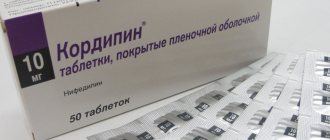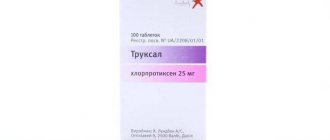Release form and composition
Dosage form - controlled-release, film-coated tablets: biconvex, round, red, the presence of individual inclusions is allowed, slight heterogeneity in the degree of gloss and coloring (in blisters of 15 or 30 pcs., in a cardboard pack, 2 or 1 blister, respectively).
Active substance: piribedil, 1 tablet – 50 mg.
Auxiliary components: povidone, talc, magnesium stearate.
Shell composition: povidone, polysorbate 80, sodium carmellose, colloidal silicon dioxide, talc, sucrose, white beeswax, titanium dioxide, sodium bicarbonate, crimson dye (Ponceau 4R).
Overdose
Pronoran, the indications for use of which are related to the action of dopamine, in case of overdose leads to excessive stimulation of the area of the brain responsible for the gag reflex.
For this reason, the patient may experience:
- nausea;
- urge to vomit;
- sudden surges in pressure (blood pressure lability).
If there are signs of overdose, Pronoran should be discontinued. Until it is completely eliminated from the body, drugs are used to eliminate symptoms and alleviate the patient’s condition.
Pharmacological properties
Pharmacodynamics
Piribedil, the active component of Pronoran, is a dopaminergic receptor agonist. The substance penetrates the bloodstream of the brain, where it binds to dopaminergic receptors in the brain. Piribedil exhibits high affinity and selectivity for dopaminergic receptors type D2 and D3. The drug is widely used in the treatment of Parkinson's disease in both early and late stages, and piribedil affects the manifestations of all major motor symptoms. This compound also exhibits the properties of an antagonist of two main alpha-adrenergic receptors of the central nervous system (type a2A and a2C).
The synergistic effect of the active component Pronoran as an agonist of dopaminergic receptors in the brain and an antagonist of A2 receptors has been proven through demonstrations in various animal models of Parkinson's disease. The result of long-term therapy with piribedil is less severe dyskinesia than with levodopa. Moreover, the effectiveness of the drug and levodopa in relation to reversible akinesia, which is a concomitant condition in Parkinson's disease, is almost identical.
Piribedil increases concentration and vigilance associated with solving cognitive problems, and also has a vasodilating effect (increases blood flow in the vessels of the lower extremities due to the presence of dopaminergic receptors in them).
Pharmacokinetics
Piribedil is rapidly and almost completely absorbed from the gastrointestinal tract, intensively distributed throughout the body. The maximum content of this substance in the blood plasma is achieved 3–6 hours after taking the tablets and is accompanied by controlled release. Piribedil has an average degree of binding to plasma proteins (the unbound fraction is 20–30%). For this reason, drug interactions between Pronoran and other drugs are insignificant.
Plasma elimination of the active substance is divided into two phases, the second being slower and helping to maintain a stable level of piribedil in the blood plasma for more than 24 hours.
A combined pharmacokinetic analysis showed that the half-life of piribedil during infusion is on average 12 hours and does not depend on the dose prescribed to the patient.
The active component of Pronoran is intensively metabolized in the liver and excreted primarily through the kidneys: 75% of absorbed piribedil is excreted in the urine in the form of metabolites.
General information about the drug
Pronoran is a long-acting drug intended for the symptomatic treatment of Parkinson's disease. Dispensed strictly according to prescription.
Drug group, INN, scope of application
Pronoran (INN - Piribedil) is a French drug that slows down the process of destruction of neurons responsible for the production of natural dopamine in the body. The medication acts as a dopamine agonist, which is why it is widely used in the treatment of Parkinson’s disease to relieve motor symptoms of the disease. Belongs to the pharmacological group of antiparkinsonian drugs.
Release form and prices for the drug, average in Russia
Pronoran is produced in one dosage form - two-layer round tablets of prolonged action, coated with a red coating. As you can see in the photo, Pronoran is sold in red cardboard packages, 30 tablets each.
The price of Pronoran depends solely on the point of sale and may differ by no more than 100 rubles.
| City | Cost, rub. |
| Moscow | 554 |
| Saint Petersburg | 545 |
| Krasnodar | 445 |
| Novosibirsk | 565 |
| Ekaterinburg | 460 |
Indications for use
- Parkinson's disease (especially in forms accompanied by tremor) (as a single drug or as part of complex therapy (in combination with levodopa) in the initial and later stages of the disease);
- Auxiliary symptomatic treatment of intermittent claudication due to obliterating diseases of the arteries of the lower extremities (stage II according to the Fontaine-Leriche classification);
- Auxiliary symptomatic treatment of chronic cognitive impairment and neurosensory deficits in the aging process (including memory and attention disorders);
- Symptomatic treatment of ophthalmological diseases of ischemic origin, including narrowing of the visual field, decreased visual acuity, decreased color contrast.
Pharmacodynamics and pharmacokinetics
Absorbed into the blood, the active substance of the drug piribedil penetrates the blood-brain barrier and enters the bloodstream of the brain. There it, binding to dopamine receptors and being their agonist, stimulates the parts of the brain responsible for human intellectual abilities.
At the same time, having the properties of an antagonist (suppressing the activity) of receptors (α-adenoceptors), the stimulation of which causes vasoconstriction and increased muscle tone, piribedil eliminates the symptoms of parkinsonism.
The properties of piribedil, as a dopamine receptor agonist and an α-adenoceptor blocker, mutually enhance each other, due to which, with regular use of Pronoran, the symptoms of Parkinson's disease are weakened and cognitive functions are partially restored:
- memory is strengthened;
- the level of concentration increases;
- the ability to assimilate new knowledge improves.
Pronoran is metabolized by the liver and excreted in the urine as metabolites. The half-life is 12 hours, while the concentration of the drug required to obtain a therapeutic effect is maintained for 24 hours.
Instructions for use of Pronoran: method and dosage
According to the instructions, Pronoran should be taken orally after meals: swallow the tablets whole and drink half a glass of water.
For Parkinson's disease the following is prescribed:
- Monotherapy: 150-250 mg per day in 3 doses; when using the highest daily dose, it is recommended to take 100 mg in the morning, 100 mg in the afternoon and 50 mg in the evening;
- Combination therapy (with levodopa): 50 mg 3 times a day.
In all other cases, 50 mg is prescribed once a day. In some cases, it is possible to increase the daily dose to 100 mg - 50 mg 2 times a day.
When selecting a dose, it is recommended to titrate it - a gradual increase by 50 mg every 2 weeks.
Price, where to buy
The price of Pronoran No. 30 is 510-700 rubles. In Ukraine, the cost of a standard package of the drug can reach 210 hryvnia.
- Online pharmacies in RussiaRussia
- Online pharmacies in UkraineUkraine
ZdravCity
- Pronoran tab. with control release.p.o.
50 mg n30 LLC Servier Rus 433 rub. order
Pharmacy Dialogue
- Pronoran tablets p/o 50 mg No. 30Servier
560 rub. order
show more
Pharmacy24
- Pronoran 50 mg N30 tablets Lab.Serv e Industries, France
181 UAH order
Side effects
Side effects are associated primarily with the dopaminergic activity of piribedil, are dose-dependent and moderate in nature, occur more often at the beginning of treatment, and disappear after discontinuation of the drug.
Classification of side effects: often (≥1/100, <1/10), uncommon (≥1/1000, <1/100).
Possible adverse reactions:
- From the digestive system: often – minor gastrointestinal symptoms (flatulence, nausea, vomiting);
- From the central nervous system: often - agitation, confusion, dizziness, hallucinations, drowsiness (in rare cases - in the daytime, up to sudden falling asleep);
- From the cardiovascular system: infrequently - orthostatic hypotension with lability of blood pressure/loss of consciousness/malaise, arterial hypotension;
- Allergic reactions.
In patients with Parkinson's disease, piribedil can cause increased libido, hypersexuality, compulsive overeating, gambling, and a desire to shop.
At what age can the drug be used?
Pronoran, the indications for use of which are determined by a specialist, is aimed at the older age category. No studies have been conducted to determine its effects on the young body, children, pregnancy and the condition of the fetus.
For this reason, the drug is not prescribed:
- patients under 18 years of age;
- pregnant women;
- nursing mothers;
Women of childbearing age can use Pronoran provided they use reliable contraception: the nature of the problems that may arise if conception occurs during the treatment period is unpredictable.
special instructions
Pronoran is mainly used in elderly patients. Given their age, be aware of the risk of falls due to sudden sleep onset, hypotension or confusion.
Patients with Parkinson's disease and their caregivers should be warned about the possibility of symptoms of behavior disorder (increased libido, hypersexuality, shopping urges, etc.) during treatment. If such disorders occur, you should consult a doctor who will consider the need to reduce the dose or gradually discontinue the drug.
In some patients (especially with Parkinson's disease), while taking piribedil, a state of severe drowsiness sometimes suddenly occurs, even to the point of suddenly falling asleep. Although this phenomenon occurs in very rare cases, patients should be warned about the possible risks. For the same reason, during treatment it is recommended to refrain from driving and performing work that requires a high degree of attention.
Brief overview of analogues and prices
Patients are often interested in analogues at a cheaper price. However, it is impossible to find a product with the same composition. The medicinal component of the tablets is piribedil, as stated in the instructions for use. There are currently no analogues of Pronoran for the active substance.
You can select drugs with a similar therapeutic effect, but with a different composition. These medications include:
- "Bromocriptine."
- "Parlodel."
- "Bromergon."
- "Cyclodol".
- "Midantan."
- "Amantadine."
- "Azilect".
- "Sinemet".
- "Vinpotropil."
- "Phenotropil".
- "Yumex."
- "Eldepril."
- "Madopar."
These drugs are also used in the treatment of Parkinson's disease. However, each medicine has its own characteristics. To compare different medications, you should carefully study the instructions for use of Pronoran and reviews of analogues. It is also important to remember that you can replace the drug only after consulting a doctor. It is unacceptable to use analogues on your own; most of them are prescription drugs.
The drugs Bromocriptine, Parlodel and Bromergon contain ergot alkaloids. This substance is also a dopamine receptor stimulant. In addition, such medications affect the pituitary gland and reduce the production of the hormone prolactin. Therefore, they are used not only for the treatment of Parkinson’s disease, but also in endocrinology. The price of these drugs is from 260 to 500 rubles.
Cyclodol is a fairly old antiparkinsonian drug. Its operating principle is different from that of Pronoran. This medicine has anticholinergic activity and can cause unpleasant side effects: dry mouth, blurred vision, difficulty urinating. For this reason, the drug is rarely used today. The disadvantages of this medication include its ability to cause addiction and dependence. It cannot be used for long-term therapy. The price of Cyclodol in pharmacies ranges from 30 to 90 rubles.
The medications Sinemet and Madopar contain levodopa. They effectively eliminate tremors of the limbs, motor retardation, and muscle rigidity. But at the same time they can cause hyperkinesis (abnormal movements). Piribedil leads to such phenomena much less often, at least that’s what the instructions for Pronoran say. Analogues with levodopa cost from 600 to 1500 rubles in pharmacies.
The drugs Amantadine and Midantan are antiviral drugs that simultaneously stimulate dopamine receptors. These drugs have a fairly extensive list of contraindications; they should not be used for diseases of the thyroid and prostate glands, epilepsy, or glaucoma. These are inexpensive medicines, they cost from 50 to 150 rubles.
Medicines "Yumex", "Eldepril", "Azilect" also stimulate dopamine receptors, but at the same time affect the metabolism of serotonin. For this reason, they are not compatible with all drugs. They should not be taken with many types of antidepressants, or with medications that stimulate the sympathetic nervous system. They also increase the side effects of drugs containing levodopa. The cost of these drugs is high - from 1000 to 3000 rubles.
The drugs "Vinpotropil" and "Phenotropil" are not always a complete replacement for "Pronoran". Instructions for use and reviews of analogues indicate that these medications have nootropic activity. They improve cerebral circulation. These drugs are effective for Parkinson's disease of vascular origin, but have little help for pathologies of other origins. Nootropics are not able to quickly eliminate limb tremors and other kinetic disorders. They can only influence the cause of the disease if the pathology arose as a result of damage to the blood vessels of the brain. The cost of Vinpotropil ranges from 150 to 350 rubles, and Phenotropil costs from 500 to 800 rubles.
Use during pregnancy and lactation
Experiments on animals did not reveal direct or indirect negative effects on the development of the embryo and fetus, the birth process and postnatal development. However, it has been proven that in mice, piribedil crosses the placental barrier and is distributed throughout the fetus. Therefore, Pronoran is not recommended for use in patients during pregnancy and women of reproductive age who do not use reliable methods of contraception.
Due to the lack of reliable information, the drug should not be used during lactation.
Contraindications
increased individual sensitivity to piribedil and/or excipients included in the drug;
collapse;
acute myocardial infarction;
concomitant use with antipsychotics (except clozapine);
children under 18 years of age (due to lack of data).
Carefully:
Due to the fact that the drug contains sucrose, patients with fructose, glucose or galactose intolerance, as well as patients with sucrose isomaltase deficiency (a rare metabolic disorder), are not recommended to take the drug.
Drug interactions
Mutual antagonism is observed between antiparkinsonian drugs (including Pronoran) and antipsychotics (except clozapine), so such combinations are contraindicated.
Patients with extrapyramidal syndrome resulting from the use of antipsychotics should be prescribed anticholinergic drugs and should not be prescribed dopaminergic antiparkinsonian drugs, because antipsychotics block dopaminergic receptors.
Dopaminergic antiparkinsonian drugs may exacerbate or cause psychotic disorders. If patients receiving piribedil require the prescription of antipsychotics, it is necessary to first stop taking Pronoran, gradually reducing the dose until completely discontinued (sudden withdrawal may lead to the development of neuroleptic malignant syndrome).
If concomitant use of antiemetic drugs is necessary, those that do not cause extrapyramidal symptoms should be prescribed.
Due to mutual antagonism, simultaneous use of tetrabenazine is not recommended.
Drinking alcohol is prohibited during treatment.
Any other drugs that have a sedative effect should be used with caution.
Pronoran
| The above information on the use of this drug is presented for informational purposes only and is intended for specialists. For more complete information, please refer to the manufacturer's instructions included in the package. Before starting to use any drug, it is recommended to consult a doctor. |
Trade name of the drug: Pronoran
International nonproprietary name : Piribedil
Dosage form: controlled release tablets
Active ingredient : Piribedil
Pharmacotherapeutic group:
Antiparkinsonian drug, including dopaminergic drug.
pharmachologic effect:
Antiparkinsonian product, stimulator of dopamine receptors and dopaminergic transmission in the central nervous system, peripheral vasodilator. Piribedil causes dopaminergic stimulation of cortical electrical activity. both during periods of wakefulness and during periods of sleep; acts on various functions controlled by dopamine. By acting on dopamine receptors located in the smooth muscles of peripheral vessels, it has a vasodilating effect (increases blood flow in the vessels of the lower extremities).
Pharmacokinetics
Suction
After oral administration, piribedil is rapidly absorbed from the gastrointestinal tract, Cmax is reached after 1 hour. As shown in vitro, the Pronoran tablet dissolves slowly, which contributes to the gradual release of the active substance in vivo.
Distribution
Plasma protein binding is low. The therapeutic concentration of piribedil is stored in the body for 24 hours or more.
Metabolism
It is characterized by a high degree of metabolism with the formation of 2 main metabolites, hydroxylated and dehydroxylated derivatives of piribedil.
Removal
The concentration of piribedil in the blood plasma decreases in two phases: T1/2 in the α-phase - 1.7 hours, in the β-phase - 6.9 hours. 68% of absorbed piribedil is excreted in the form of metabolites in the urine; 25% - with bile. After 24 hours, 50% of the product is excreted in the urine, after 48 hours - 100%.
Indications for use:
auxiliary symptomatic therapy for chronic impairment of cognitive functions and neurosensory deficits during the aging process (disorders of attention, memory, etc.);
Parkinson's disease: monotherapy (for forms predominantly involving tremor) and as part of combination therapy with levodopa both in the initial and later stages of the disease, especially in forms including tremor;
as an auxiliary symptomatic therapy for intermittent claudication resulting from obliterating diseases of the arteries of the lower extremities (stage 2 according to the Leriche and Fontaine classification);
treatment of symptoms of ophthalmological diseases of ischemic origin (decreased visual acuity, narrowing of the visual field, decreased color contrast, etc.).
Contraindications:
increased individual sensitivity to piribedil and/or excipients included in the drug;
collapse;
acute myocardial infarction;
concomitant use with antipsychotics (except clozapine);
children under 18 years of age (due to lack of data).
With caution: due to the fact that the drug contains sucrose, patients with intolerance to fructose, glucose or galactose, as well as patients with sucrose isomaltase deficiency (a rare metabolic disorder), are not recommended to take the drug.
Directions for use and doses:
Inside. The tablet should be taken after meals with half a glass of water without chewing.
For all indications except Parkinson's disease: 50 mg (1 tablet) 1 time per day. For more severe cases: 50 mg twice daily.
Parkinson's disease:
monotherapy: 150 to 250 mg (3 to 5 tablets) per day, divided into 3 doses per day. If you need to take the drug at a dose of 250 mg, it is recommended to take 2 tablets of 50 mg in the morning and afternoon and one tablet in the evening.
in combination with levodopa drugs: 150 mg (3 tablets) per day, recommended divided into 3 doses.
When selecting a dose, if it is increased, it is recommended to titrate the dose, gradually increasing it by one tablet (50 mg) every two weeks.
Side effect:
From the digestive system: uncommon - nausea, vomiting, flatulence (these symptoms can be eliminated by selecting the appropriate individual dose).
From the side of the central nervous system: not often - drowsiness (in some cases, severe drowsiness that suddenly occurred during the daytime was noted), mental disorders such as anxiety or confusion, which disappear when the product is discontinued.
From the cardiovascular system: not often - orthostatic hypotension or blood pressure lability. Other: allergic reactions.
Pregnancy and lactation
Pronoran is not recommended for use during pregnancy, because There have been no adequate and well-controlled studies of the safety of the product during pregnancy. Experimental studies have not established the teratogenic effect of the product.
Drug interactions:
Due to the mutual antagonism between dopaminergic antiparkinsonian drugs and antipsychotics, simultaneous administration with antipsychotics (except clozapine) is contraindicated.
Patients with extrapyramidal syndrome caused by taking antipsychotics should be treated with anticholinergic drugs and should not be prescribed dopaminergic antiparkinsonian drugs (due to the blocking of dopaminergic receptors by neuroleptics).
Dopaminergic antiparkinsonian drugs may cause or worsen psychotic disorders. If the prescription of antipsychotics is required in patients with Parkinson's disease receiving treatment with dopaminergic antiparkinsonian drugs, the dose of the latter should be gradually reduced until permanent discontinuation (sudden withdrawal of dopaminergic drugs is associated with the risk of developing neuroleptic malignant syndrome).
Antiemetic neuroleptics: Antiemetic drugs that do not cause extrapyramidal symptoms should be used.
Due to the mutual antagonism between dopaminergic antiparkinsonian drugs and tetrabenazine, simultaneous use of these drugs is not recommended.
The simultaneous use of piribedil with alcohol is not recommended.
Caution should be exercised when using piribedil with other drugs that have a sedative effect.
Conditions for dispensing from pharmacies: with a doctor's prescription.
Shelf life: 3 years
Manufacturer: Servier, France (4607159860088)
